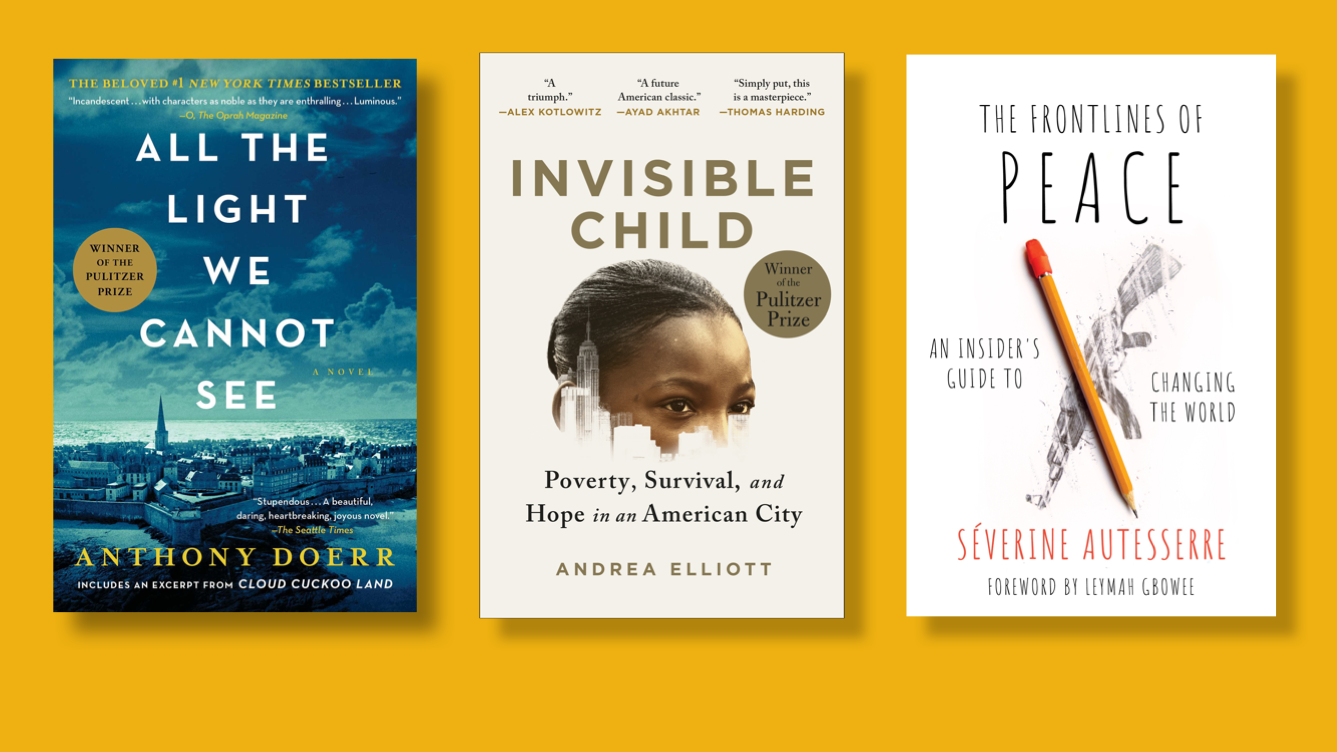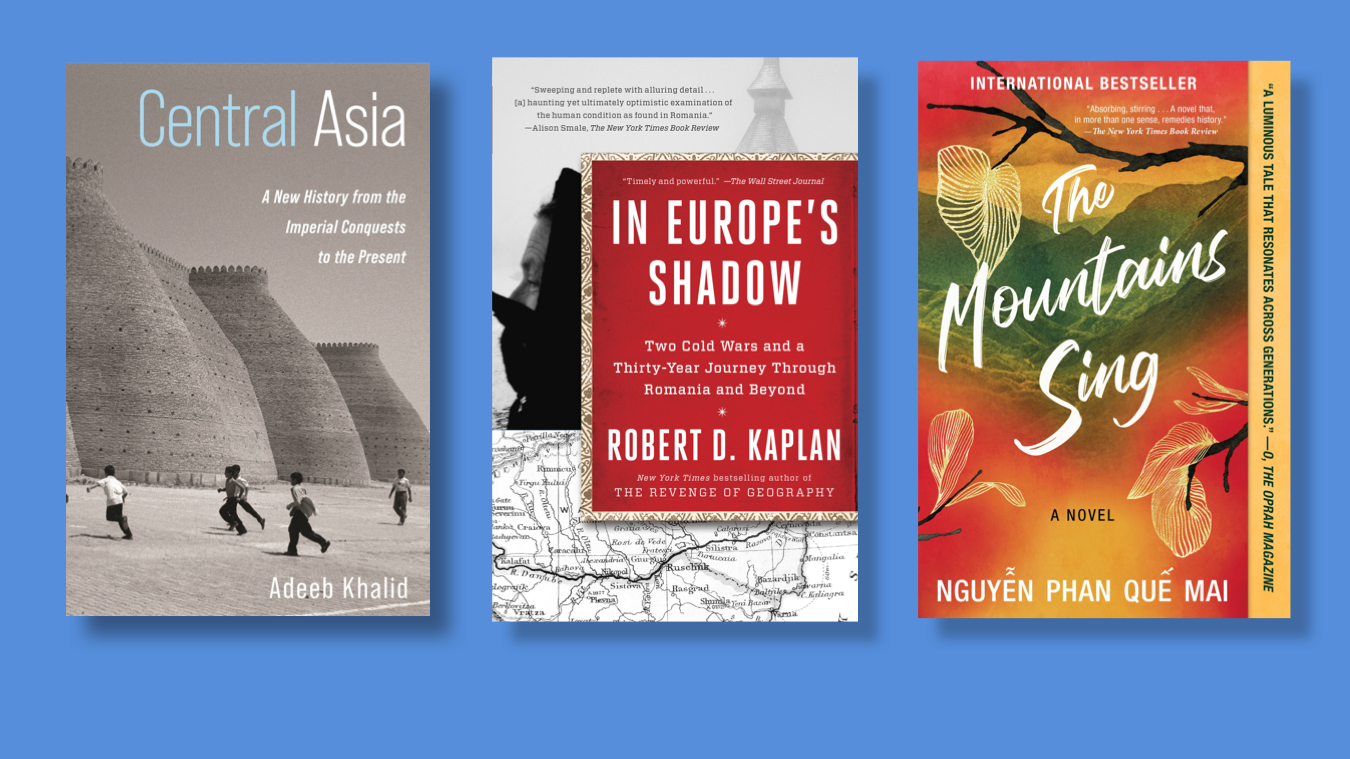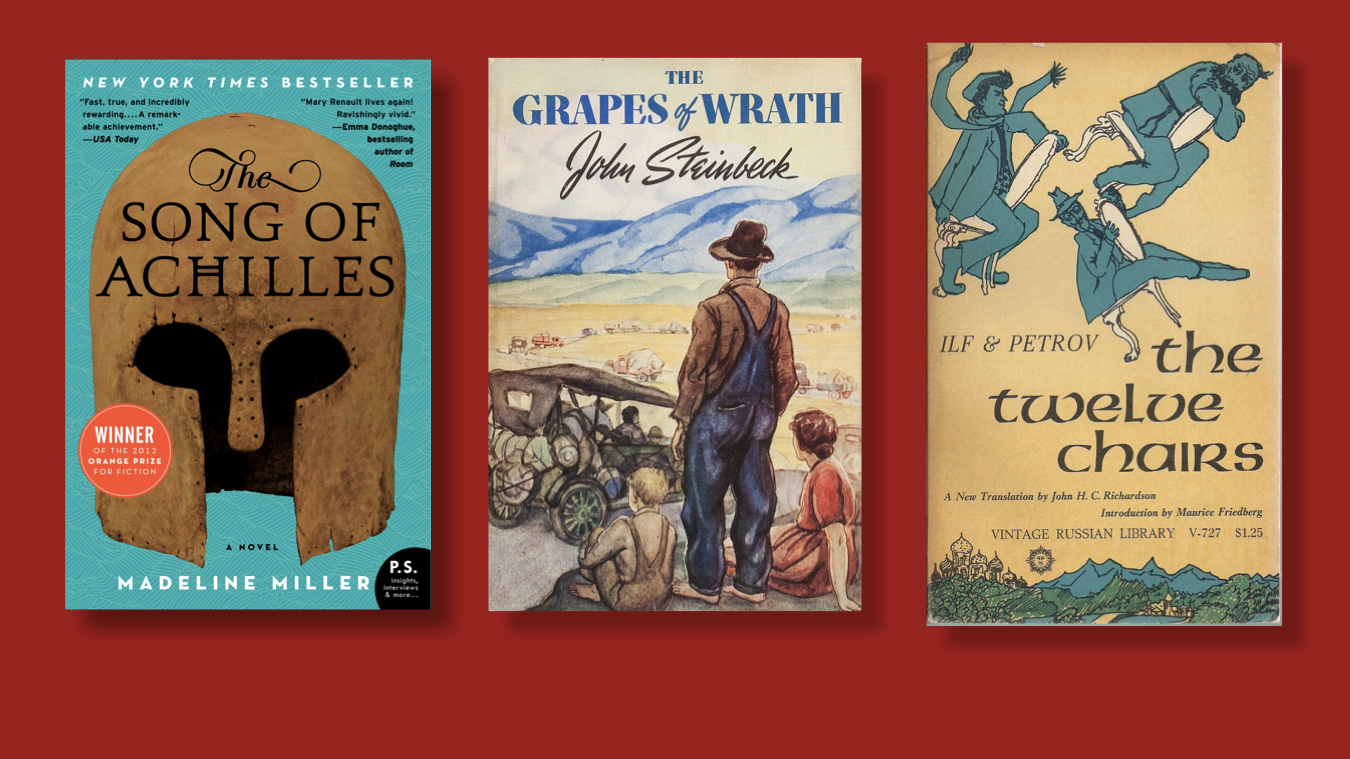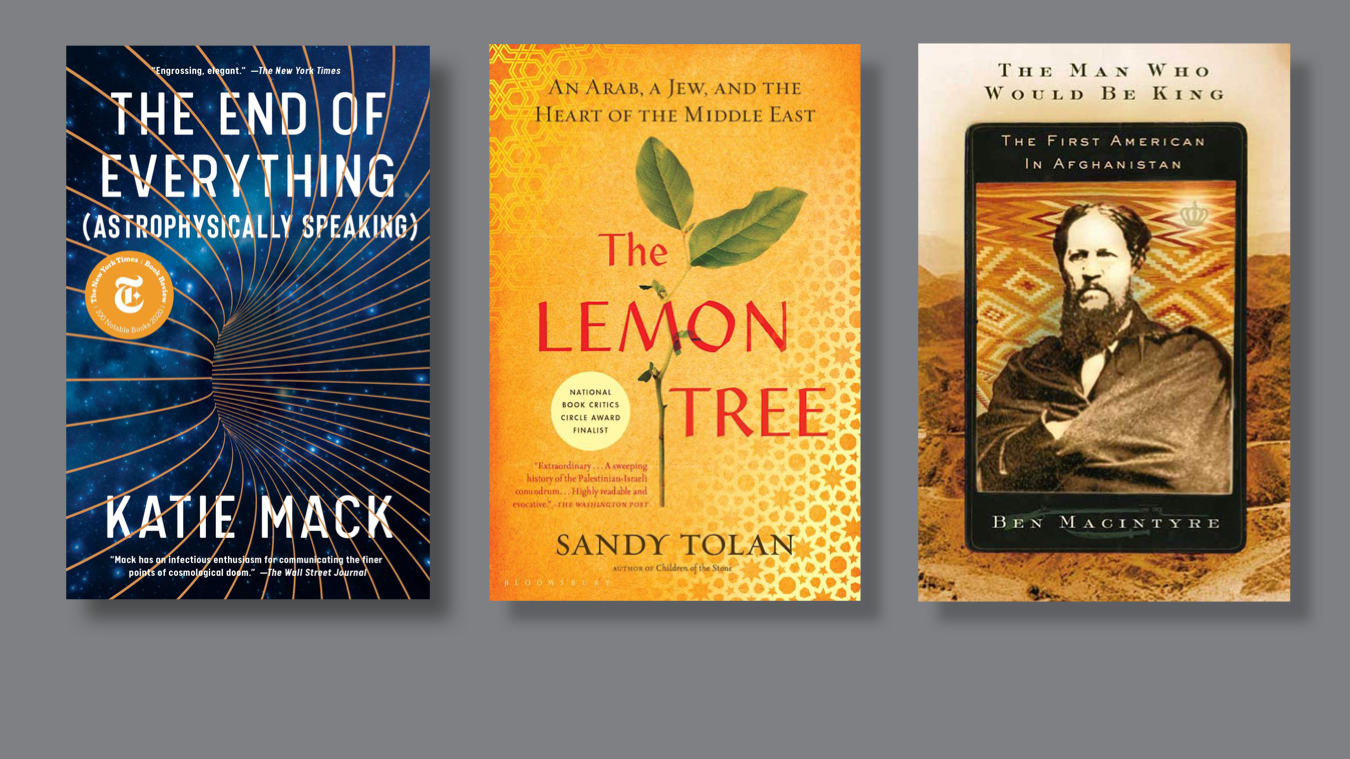Here’s what our experts are reading this summer
At the Atlantic Council, our experts are powered by their knowledge about what’s happening in the world—and their passion for changing it for the better.
So in a departure from their usual analysis, we’ve asked them to recommend the books that have helped fuel that passion, from Greek Classics and tragic histories to triumphant tales of courage. These are the summer reads that keep them inspired and their minds sharp—whether at the beach, on a road trip, or just lounging around under the sun.
The links below connect to Bookshop.org, a site that helps support local bookstores in Spain, the United Kingdom, and the United States.
Tales of resilience

All the Light We Cannot See by Anthony Doerr. This book quickly became one of my favorites. It’s captivating and a must-read! I can’t recommend it enough!
—Sarah Knight, project manager of engagement at the Atlantic Council
Invisible Child: Poverty, Survival and Hope in an American City by Andrea Elliot. The author of the book followed Dasani, a homeless child in New York City, for eight years as she traversed through shelters, parks, streets, and temporary housing. This book is a stark reminder of the inequality that is so seamlessly integrated in our daily life that it is almost invisible; the book is a great choice for policymakers thinking about inequality and adversity in their work.
—Ananya Kumar, assistant director for digital currency at the Atlantic Council’s GeoEconomics Center
The Frontlines of Peace: An Insider’s Guide to Changing the World by Séverine Autesserre. How can lasting peace be built in conflict zones and what can regular citizens do to help? This book provides an interesting answer to this age-old question through inspiring storytelling mixed with excellent, yet approachable, cutting-edge peacebuilding research.
—Anca Agachi, associate director of the Transatlantic Security Initiative at the Atlantic Council’s Scowcroft Center for Strategy and Security
Going There by Katie Couric. In Katie Couric’s compelling autobiography, she shares her deeply personal story from growing up in Arlington, VA, to losing her husband to colon cancer at a young age, and to her beginnings on the Today Show. A great revisit of past historical events (everything from the September 11 attacks to the start of the “Me Too” movement) and how she covered them—including her vibrant personality and relatable humor in every chapter. I listened via audiobook and would highly recommend, as Couric herself narrates.
—Lauren Holland, deputy director of events at the Atlantic Council
On Boxing by Joyce Carol Oates. Can’t say it better than the bookflap: “No other subject is, for the writer, so intensely personal as boxing. To write about boxing is to write about oneself—however elliptically, and unintentionally. And to write about boxing is to be forced to contemplate not only boxing, but the perimeters of civilization—what it is, or should be to be ‘human.’” Bearing witness to rivalry, intellectual sparring, and power competition is part of the Atlantic Council’s DNA. If you’ve ever read Sun Tzu as a geopolitical or business treatise then consider On Boxing as a worthy vessel of metaphorical contemplation.
—Stephanie Wander, director of programs at the GeoTech Center
Matrix by Lauren Groff. The bestseller buzz and all the awards brought this to my attention, and even with those high expectations, I was floored by the impact this book had on me. For all the incredible writing and imagination, it’s most importantly a reminder that determination, leadership, optimism, and courage—in the hands of the right person—can change our fortunes for the better. A lesson for our times by way of a medieval nunnery.
—Chris Skaluba, director of the Transatlantic Security Initiative at the Atlantic Council’s Scowcroft Center for Strategy and Security
The Women With Silver Wings: The Inspiring True Story of the Women Airforce Service Pilots of World War II by Katherine Sharp Landdeck. The most comprehensive look at the more than one thousand women who made up the Women Airforce Service Pilots, the story of the program, and the impact they had on training pilots, ferrying aircraft to combat zones, testing new aircraft and equipment, and a host of other flying duties that significantly contributed to the Army Air Forces’s success in World War II.
—Tyson Wetzel, nonresident senior fellow at Forward Defense in the Atlantic Council’s Scowcroft Center for Strategy and Security
Captivating histories

The Gates of Europe: A History of Ukraine by Serhii Plokhy. Essential reading for understanding Ukrainian history, making sense of the war today, and dispelling Russian narratives about its so-called “historical lands.”
—Eric Adamson, project manager of the Northern Europe office of the Atlantic Council’s Europe Center
Central Asia: A New History from the Imperial Conquests to the Present by Adeeb Khalid. Histories of Central Asia typically cover solely the post-Soviet states (and sometimes Afghanistan), while focusing on the impact of Russians in the region. Khalid expands this history in both subject matter and geographic range, exploring the impact of the reforming Central Asian jadid movement as well as tying the history of East Turkestanand China into this region. An excellent primer for anyone seeking to understand contemporary Central Asia and its relations with Russia and China today.
—Jacob Levitan is a young global professional at the Scowcroft Strategy Initiative of the Atlantic Council’s Scowcroft Center for Strategy and Security
The Republic of False Truths by Alaa Al Aswany, translated by S. R. Fellowes. This is a fictional read exploring life around the Egyptian revolution of 2011 and its aftermath. The book is banned in most of the Middle East and Alaa is in exile, which in and of itself is evidence of the power his words hold. As a Pakistani-American, this book hit a little too close to home, highlighting to me how Egypt, much like Pakistan, continues to be hamstrung by its colonial past and how great power competition and geopolitics have destroyed the ambitions and aspirations of successive generations.
—Uzair Younus, director of the Pakistan Initiative at the Atlantic Council’s South Asia Center
The Anglo-Saxons: A History of the Beginnings of England: 400–1066 by Marc Morris. This is the best book I’ve read about a topic I follow. The author is known for his professionalism and knowledge of sources about Anglo-Saxon history. What’s more: he book debunks myths that have been overlapping for centuries, calling upon primary sources and an explanation of the political situation immediately after the withdrawal of Roman legions from Britain.
—Ruslan Trad, resident fellow for security research with the Atlantic Council’s Digital Forensic Research Lab
In Europe’s Shadow: Two Cold Wars and a Thirty-Year Journey Through Romania and Beyond by Robert D. Kaplan. This book is a well-documented written account of what life in Romania was like during the brutal communist reign of former President Nicolae Ceaușescu. I wanted to deepen my understanding of the massive cultural, economic, political, and humanitarian shift that occurred in Romania, which led to its democratic rise after the revolution in 1989. I recommend this book to anyone who wants to further their knowledge about the former Soviet grip on Europe.
—Andrea Rațiu, digital production assistant at the Atlantic Council
The Anarchy: The East India Company, Corporate Violence, and the Pillage of an Empire by William Dalrymple. This is a fascinating book about how the Indian subcontinent was colonized in what is perhaps the world’s first takeover of a civilization by a multinational company. Dalrymple is a fantastic historian focusing on the Indian subcontinent and this book is a must-read for anyone trying to understand how and why the subcontinent was colonized—and why India, to this day, views foreign multinationals with suspicion.
—Uzair Younus, director of the Pakistan Initiative at the Atlantic Council’s South Asia Center
The Mountains Sing by Nguyễn Phan Quế Mai. This book is a sad yet beautiful reconstruction of Vietnam’s devastating history from the French occupation to the end of the US invasion. Through the eyes of a grandmother and her granddaughter, the book tells the story of a family that underwent destruction, famine, poverty and war, and their quest to find happiness and love once Vietnam finally gained independence.
—Alissa Pavia, associate director at the Atlantic Council’s Rafik Hariri Center and Middle East Programs
Beyond the Steppe Frontier: A History of the Sino-Russian Border by Sören Urbansky. I recommend this book by an author who knows well what he says and writes. Urbansky is one of the best historians to explore the borderlands between Russia and China. Against the backdrop of today’s events, this area—thousands of miles long—will become increasingly important. Chinese and Russians see their relationship as difficult, reminding me of a simple fact: There is a single bridge that crosses the border.
—Ruslan Trad, resident fellow for security research with the Atlantic Council’s Digital Forensic Research Lab
Man in the White Sharkskin Suit by Lucette Lagnado. A meaningful memoir that gives the reader a look into the lives of a Jewish family living in Cairo during WWII.
—Samantha Treiman, assistant director of media and communications for the Atlantic Council’s Middle East Programs
El Norte: The Epic and Forgotten Story of Hispanic North America by Carrie Gibson. A nation is composed of a shared experience, history, languages, culture, and traditions; there’s so much of the essence and character of the United States that can only be grasped by studying and grappling with less-taught history that started (even before the Pilgrims) in the South and Southwest.
—María Fernanda Bozmoski, deputy director of programs at the Atlantic Council’s Adrienne Arsht Latin America Center.
Diplomat Among Warriors: The Unique World of a Foreign Service Expert by Robert Murphy. When I found myself talking to Ambassador Ryan Crocker, a giant in US diplomacy, he suggested I read this memoir. Murphy was present at the creation of modern US diplomacy, and his book both honors the important work and is an unassuming, at times even chatty, account of the leaders and events of the era.
—John Cookson, social media editor
The classics

The Song of Achilles and Circe, both by Madeline Miller. These novels present imaginative backstories for secondary characters from the Iliad and the Odyssey, respectively, and offer moving portraits of different types of loving relationships. Perfect beach reading, especially if that beach is on an island in the Aegean.
—Will Wechsler, senior director of the Rafik Hariri Center and Middle East Programs at the Atlantic Council.
The Grapes of Wrath by John Steinbeck. As a foreigner living in the United States, I’m trying to read (and reread) American classics to guide me through the country’s history, politics, and culture. I’m on the road from DC to California, which brought me back to Steinbeck. I’m fascinated by how he makes me feel, with all my senses, the pain and happiness that the people of this land experienced a few decades ago, seemingly so different from ours, but indispensable to understanding our present moment. Terrifying and beautiful at the same time.
—Petr Tůma, visiting fellow at the Atlantic Council’s Europe Center
The Twelve Chairs by Ilya Ilf and Evgeny Petrov. One of my favorite Soviet works, a great satirical piece lampooning the Soviet system during the New Economic Policy period. It follows former nobleman Ippolit Vorobyaninov and conman Ostap Bender scouring the Soviet Union for one of twelve chairs that Vorobyaninov’s mother-in-law hid the family jewels in.
—Jacob Levitan is a young global professional at the Scowcroft Strategy Initiative of the Atlantic Council’s Scowcroft Center for Strategy and Security
Just good reads

Dishoom by Shamil Thakrar, Kavi Thakrar, and Naved Nasir. I was kindly gifted this cookbook from a dear friend at the Council. I am slowly making my way through the recipes, which are accompanied by beautiful stories and photos of the life and food in Bombay. Highly recommend the black daal and mattar paneer.
—Samantha Treiman, assistant director of media and communications for the Atlantic Council’s Middle East Programs
They Can’t Kill Us Until They Kill Us by Hanif Abdurraqib. I spent a lot of this year reading collections of short-form writing (due to my pandemic-induced short attention span), and this book, which is a mix of music and literary criticism, was my favorite. I revisit the essay “On Future and working through what hurts” all the time, which (as you may have guessed) is about the recording artist Future, grief over the passing of a loved one, and resilience.
—Ananya Kumar, assistant director for digital currency at the Atlantic Council’s GeoEconomics Center
The End of Everything: (Astrophysically Speaking) by Katie Mack. Recent pictures unveiled by the National Aeronautics and Space Administration (NASA) from the James Webb Telescope allow humanity to look farther than at any point in history, ever. This book explores the universe and how it may eventually come to an end. A fantastic read that helped me think about our own place in the universe and how irrelevant we all are, in the grand scheme of things.
—Uzair Younus, director of the Pakistan Initiative at the Atlantic Council’s South Asia Center
Josiah the Great: The True Story of the Man Who Would Be King by Ben Macintyre. The true story of the first-recorded American in Afghanistan, Pennsylvania Quaker Josiah Harlan, who inserted and asserted himself as an independent player in the nineteenth century “Great Game” over Central Asia, eventually carving out a title of royalty and (allegedly) inspiring Rudyard Kipling’s book, The Man Who Would Be King.
—Grady Wilson, associate director of the Atlantic Council IN TURKEY
The World for Sale by Javier Blas and Jack Farchy. An exposé of the immense power wielded on international markets by the giants of commodity trading who deal in oil, gas, and metals. The book details how since the founding of the Organization of the Petroleum Exporting Countries (OPEC), these trading houses have become central to the globalization of energy and commodity markets, enabling products to meet a market anywhere in the world—and often generating enormous profits while doing so. The book details how transformative the rise of these trading houses has been for the course of geopolitics.
—William Tobin, program assistant at the Atlantic Council’s Global Energy Center
Thinking, Fast and Slow by Daniel Kahneman. For those interested in understanding our built-in biases and how we can encourage “slower,” more logical thinking, this is the perfect book. It’s already a classic for behavioral economists and strategic foresight practitioners, but it has wide professional (and practical!) applicability in many other fields—not to mention it’s fun enough to qualify for a beach read.
—Anca Agachi, associate director of the Transatlantic Security Initiative at the Atlantic Council’s Scowcroft Center for Strategy and Security
The Lemon Tree: An Arab, a Jew, and the Heart of the Middle East by Sandy Tolan. Dive into the stories of two families through lead characters Dalia’s and Bashir’s eyes. Their lived experiences from opposite sides and vidid recollections shed new light on the conflict between Israelis and Palestinians.
—Léa Filali, human resources specialist of talent management at the Atlantic Council.
The Round House by Louise Erdrich. This is an electrifying fictional read about crime and revenge set in the late 1980s on an Ojibwe reservation in North Dakota. The book is suspenseful and offers great insight into the justice system for Native Americans. Reading this book was an eye-opener and was definitely one of my highlights this summer!
—Samantha Wong, young global professional with the Atlantic Council’s Global China Hub
America’s Great-Power Opportunity by Ali Wyne. This new book is a necessary reminder that within great-power competition—and even at its center—should be a forward-looking, affirmative conception of the US role in the world, one that “enhance[s] its strategic position no matter what decisions China, Russia, or any other competitor makes.”
—John Cookson, social media editor